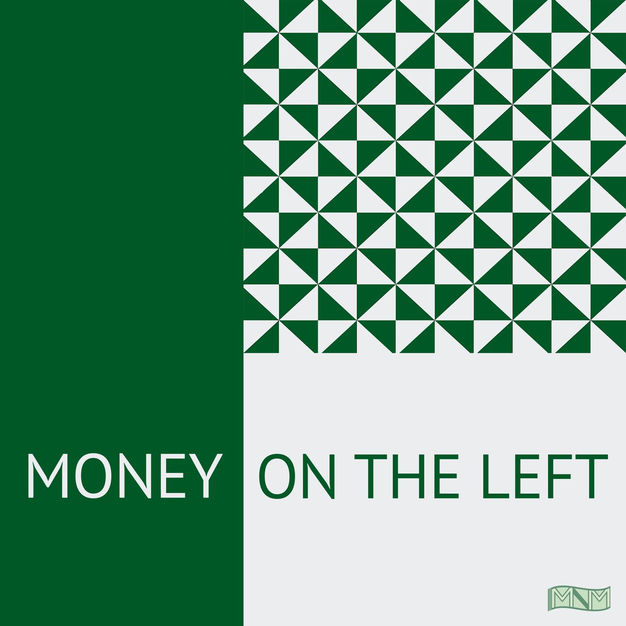
Macro N Cheese
Steve Grumbine
Macroeconomics has never been so ... delish! Macro and Cheese explores the progressive movement through the lens of Modern Monetary Theory, with hot and irreverent political takes, spotlights in activism, and the razor sharp musings of Real Progressives Founder and host Steve Grumbine. The cheese will flow as experts come in for a full, four course deep dive into the hot queso. Comfort Food for Thought!
- 1 hour 59 secondsBe the Revolution with Jay Ponti
**On Tuesday evening we’re holding a listening party and informal discussion of this episode. Join us for Macro ‘n Chill. Register here: https://us06web.zoom.us/meeting/register/tZArcuqsqD0tH92MxVmJIqj4PHtojQGgFl2l
Grassroots political organizer Jay Ponti talks with Steve about his book, "Be the Revolution: How Occupy Wall Street and the Bernie Sanders Movement Reshaped American Politics." Jay maintains that there’s a vibrant network of people doing great work that isn’t covered by corporate media.
“Politicians are not heroes who can save us. We have to save ourselves. That's what the Occupy Wall Street movement taught me. We can't rely on someone else to make the changes we want to see. We have to get organized, we have to get active, and we have to fight for our own rights.”Jay shares his experiences in Occupy Wall Street and the motivations behind it. He describes how the movement emerged as a response to the 2008 financial crisis and the fraudulent practices of financial institutions. He also touches on the Bank Exit campaign, which aimed to divest from banks funding the Dakota Access Pipeline. He speaks of the challenges and successes of the campaign and its connection to the broader movement for social and economic justice.
Steve and Jay discuss the need for grassroots movements and an inside-outside strategy to bring about real change.
Jay Ponti is a grassroots political organizer, trainer, and consultant who has participated in some of the most important social movements of the last decade, including Occupy Wall Street, Standing Rock, and Bernie Sanders’s two presidential campaigns. He is the author of "Be the Revolution: How Occupy Wall Street and the Bernie Sanders Movement Reshaped American Politics,"
Find his work at jayponti.com
@jayponti on Twitter
18 May 2024, 12:00 pm - 1 hour 3 minutesWhat Democracy? with Aaron Good
Aaron Good, a political scientist and historian, talks with Steve about the US political system and power dynamics. They explore the roles of the deep state and oligarchy in policy-making and the suppression of democracy.
“This is a very low point in the history of democracy. Perhaps the lowest point ever, if you put it in a historical context. The United States was never really a democracy. Democracy isn't so much an either/or proposition, I would say it's a continuum ...
“Even in the generic sense of political rights and universal suffrage and basic 'one person, one vote' rules, the US comes up short. The electoral college is a ridiculous system. There are barriers to getting on the ballot.”The conversation includes a discussion on the role of empire and the pursuit of global dominance in shaping US politics and policies. Aaron argues that the US prioritizes its imperial ambitions over domestic issues, resulting in a loss of political power for most of the population.
Aaron Good holds a doctorate in political science from Temple University. He is the author of American Exception: Empire and the Deep State. Find his podcast at patreon.com/americanexception
Follow Aaron’s work at americanexception.substack.com/
@Aaron_Good_ on Twitter
11 May 2024, 12:00 pm - 57 minutes 33 secondsInsurgent Labor with David Van Deusen
In a previous episode of this podcast, David Van Deusen spoke about the radical ten-point program adopted by the Vermont State Labor Council, AFL-CIO. This time, he and Steve discuss David’s new book, Insurgent Labour: The Vermont AFL-CIO from 2017 to 2023.
They look at the importance of working-class unity, the need for unions to be more democratic and inclusive, and the need for a new approach to labor organizing. They touch on the problems of racial oppression, police unions, global labor movements, healthcare, and the futility in relying on the political parties. David's book provides insights and lessons from their experiences in Vermont, offering a potential roadmap for a more effective and inclusive labor movement in the US and abroad.
They discuss the global race to the bottom and international solidarity of the working class.
“We can't have the US government foreign policy defining our foreign policy as a labor movement. We need to look for those groups that are truly engaged with struggles against the capitalists, against the elite, against the billionaires. And we need to make one on one direct relationships with them and support them where we can ... We should be reaching our hands out as a labor movement, as a US labor movement, saying 'what can we do to support you?' Because if they win there, they're going to set the example that could spread to other regions of the Middle East, Europe, and aspects of the United States. And shouldn't we be supporting democracies, especially those that actively invite labor activists, labor unions, to be part of the molding of the society that they labor within?”Check out the other interview with David:
David Van Deusen is a longtime organizer and militant union leader. He served two terms as President of the Vermont AFL-CIO (2019-2021 & 2021-2023) and is part of the working class left United! Slate. He is also a member of Democratic Socialists of America and a past member of Anti-Racist Action. His new book from PM Press is called Insurgent Labor: The Vermont AFL-CIO 2017-2023.
4 May 2024, 12:00 pm - 43 minutes 25 secondsIs Bail Reform the Answer? with Jeff Clayton
When most of us think about bail, we focus on the financial burden it presents to the accused. This week’s guest is Jeffrey J. Clayton, Executive Director of the American Bail Coalition. He talks to Steve about the complicated anti-democratic trap that is our criminal justice system.
Jeff explains that across the US there are plans in place to eliminate bail. (One would think that’s good news. One would be wrong.) In reality, these plans result in greater violations of civil liberties. Bail is being replaced by pre-trial incarceration and risk assessment tools using computer algorithms (AKA profiling?)
In his dissent in United States v. Salerno, Justice Thurgood Marshall warned that we are quickly moving to a criminal justice system where "a person innocent of any crime may be jailed indefinitely." Marshall called the bail system a shortcut to conviction.
Steve and Jeff discuss the most obvious ways to address crime – by providing jobs, housing, and education or training. Some caught up in the criminal justice system need recovery treatment. In the US, those healthcare services have become punitive. Jeff refers to them as the dragnet of the state.
Steve speaks of addressing the material conditions that contribute to criminal behavior. He brings up the concept of a federal job guarantee and talks about resource allocation and macroeconomic justice.
Jeffrey J. Clayton serves as the Executive Director of the American Bail Coalition (ABC). He holds a B.B.A. from Baylor University, an M.S. in Public Policy from the University of Rochester, N.Y., and a J.D. from the Sturm College of Law, University of Denver.
@ambailcoalition on Twitter
27 April 2024, 12:00 pm - 1 hour 20 minutesRP Live: Putin's Russia with Esha Krishnaswamy
**Check our website for upcoming events such as book clubs, RP Live webinars, and the Tuesday evening discussion group, Macro ‘n Chill. https://realprogressives.org/
This week’s episode is the audio track of a recent webinar with historian Esha Krishnaswamy. Esha is now living in Russia to research and write a people’s history of the Soviet Union.
The discussion begins with the story of the First World War and the Bolshevik Revolution. The formation of the USSR as a proletarian state shook the capitalist nations of the West to their core. As a result, the Soviet Union was regularly under threat economically, militarily, as well as propaganda warfare.
Esha talks about the history of the Soviet Union and its ultimate dissolution against the will of the majority. She delves into the impact of its fall on various countries and the global economy. She looks at the shock doctrine years of Boris Yeltsin in the 1990s and the effects of such extreme austerity and privatization on the average citizens. She then goes into the Putin era and the move towards social democracy.
Finally, she touches upon NATO, the IMF, and the war in Ukraine.
Esha Krishnaswamy is a writer and media critic, whose focus is on history, foreign policy, and Modern Monetary Theory. She hosts Historic.ly and Late Nights with Lenin.
Find her work at historicly/substack.com
@eshaLegal on Twitter
20 April 2024, 12:00 pm - 54 minutes 43 secondsAssange: In Defense of Journalists & Whistleblowers with Kevin Gosztola“Assange is being targeted by the US government because he doesn't conform to the dominant culture of the US prestige media. He's not going to be invited to the White House Correspondents' Dinner. He's not going to be given a Pulitzer. He's not going to be treated as one of them.”
Steve’s guest is journalist Kevin Gosztola, author of Guilty of Journalism: The Political Case Against Julian Assange. Kevin has been advocating for freedom of the press since the George W. Bush administration and the imperialist wars in Iraq and Afghanistan.
Steve and Kevin discuss the lack of available unbiased information, particularly regarding events like the ongoing genocide in Gaza and the presidential election. They look at the collusion between mainstream media outlets and the government, the demonization of individuals who counter the mainstream narrative, and the targeting of journalists and newsrooms.
They highlight the efforts of the US empire to prevent information from reaching the public and discuss the significance of the documents published by WikiLeaks. They also discuss Assange's current situation and the deterioration of his health.
Kevin Gosztola is a journalist, press freedom advocate, and the author of Guilty of Journalism: The Political Case Against Julian Assange from Censored Press and Seven Stories Press. He publishes The Dissenter Newsletter at TheDissenter.org and has spent the past 10-15 years reporting on Assange, WikiLeaks, the war on whistleblowers, press freedom, and government secrecy.
@kgosztola on Twitter
13 April 2024, 12:00 pm - 53 minutes 48 secondsDefining Value with L. Randall Wray
**RP Book Club is beginning a new series, Sunday April 7, 14, and 21, at 3pm ET/12pm PT. Register once for all three sessions. realprogressives.org/event/rp-book-club-the-communist-manifesto/2024-04-07
L. Randall Wray talks with Steve about the concept of value in the context of MMT. Randy discusses the labor theory of value and the liquidity premise theory, saying both approaches are critical to understanding how money works in a capitalist economy.
Randy looks at the historical development of economic thought and the neoclassical revolution of the 1870s, which aimed to prove that a free-market economy could reach equilibrium without considering money. He explains why this just isn’t so. He compares and contrasts the intentions and conclusions of Keynes and Marx. He emphasizes the need to look beyond surface phenomena and understand the structure of the capitalist economy to determine the value of money.
The conversation also goes into the importance of the federal job guarantee in setting wages and stabilizing the value of labor.
L. Randall Wray is a Professor of Economics at Bard College and Senior Scholar at the Levy Economics Institute.
www.levyinstitute.org
6 April 2024, 12:00 pm - 1 hour 10 minutesClass, Capitalism, and MMT with Bill Mitchell
A hundred years ago, John Maynard Keynes predicted we would see a massive expansion of growth and productivity under capitalism. Bingo. He got that right. He said this amazing efficiency would result in a shorter work week with far more leisure time for everyone. Oops. Not so much. The structure of capital ownership will never permit it.
Bill Mitchell’s blog post, Keynes Was Wrong Because He Failed to Consider Class Conflict, was the inspiration for this episode. Bill talks with Steve about many of the truths about capitalism economists and historians get wrong, beginning with the idea that capitalism freed workers from the bonds of feudalism.
Bill covers the social democratic politics of the postwar era and how the ruling elites then ensured that government would only serve as their agent. He and Steve take a critical look at the dangerous power of institutions like the World Bank and IMF. Bill explains why he supports degrowth instead of “green growth.”
Bill believes progressives shouldn’t be working to reform the system; they must work to change it. Coming from the Marxian tradition, he says MMT is only part of the story.
“Yes, it provides a first class lens into monetary operations but it doesn't have a theory of power. And you have to add that ideological layer for it to be, in my view, a purposeful framework for advancing systemic change. Just to have an MMT understanding provides you with no additional tools to work out systemic change.”Bill Mitchell is a Professor in Economics and Director of the Centre of Full Employment and Equity (CofFEE), at the University of Newcastle, NSW, Australia. He is also a professional musician and plays guitar with the Melbourne Reggae-Dub band – Pressure Drop. Follow his work on https://billmitchell.org/blog/
@billy_blog on Twitter
30 March 2024, 12:00 pm - 1 hour 17 minutesFinding Your Why with Steve Grumbine
This episode of Macro N Cheese is dedicated to Steve’s mom, Joan Grumbine. Her kindness, love, and unwavering dedication to her family and community will be deeply missed. May she rest in peace.
In his first solo episode, our host and jefe, Steve Grumbine, recounts the story of his political transformation from conservative republican to passionate MMT advocate, to self-identified socialist.
He begins the episode talking about his recent experience dealing with the medical system as his mother’s health declined. Both parents’ deaths illustrate the fact that a for-profit system cannot provide the kind of healthcare we need and deserve.
Awareness of class discrepancy runs through his story as he develops an awareness of the need to combine MMT with an understanding of capitalism.
It's impossible to separate Steve’s political development from his work on this podcast. Many of the guests affect him profoundly. In the episode he ties these insights together to create a radical and comprehensive worldview.
Steve Grumbine is the founder and CEO of Real Progressives and Real Progress in Action. He is a project manager by profession.
@sdgrumbine on Twitter
23 March 2024, 12:00 pm - 54 minutes 42 secondsThere Is No Magic Pricing Fairy with Brian Romanchuk
** Be sure to check the Real Progressives website’s calendar for upcoming events. On Sunday, March 17th at noon ET/9am PT, we’re hosting a webinar, RP Live with Esha Krishnaswamy: Putin’s Russia. On Tuesday evenings, 8pm ET/5pm PT, come to Macro ‘n Chill, where we listen to the most recent episode of this podcast and discuss it with the community. https://realprogressives.org/rp-events-calendar/
“Inflation is always and everywhere a monetary phenomenon, in the sense that it is and can be produced only by a more rapid increase in the quantity of money than in output.” Milton Friedman
This quote by the grandaddy of neoliberal economics is from 1963. Some in the mainstream have been dining out on it ever since.
According to our guest, author and blogger Brian Romanchuk, neoclassical economics relies on mathematical models and fail to capture the complexity of real-world inflation. He highlights the importance of understanding the supply and demand dynamics in setting prices and explains that inflation can be influenced by factors such as supply chain shocks and changes in the labor market.
Brian also points out that it’s not enough to blame inflation on corporate greed; after all, corporations are always driven to maximize profits. He mentions the Cantillon effect, which suggests that the first recipients of newly created money benefit from inflation as prices go up, while the poor and working class bear the brunt of higher prices down the road.
Brian and Steve discuss inflation constraints on fiscal policy. Brian argues that while extreme fiscal policies could lead to inflation, most of the time, fiscal policy is relatively moderate and does not have a significant impact on inflation. They criticize the government for not trying to set prices and argue that the government often follows the private sector's lead, making things worse.
Brian Romanchuk is the author of several books, including Modern Monetary Theory and the Recovery. He is the writer and publisher of bondeconomics.com. His writings can be found in his substack, The BondEconomics Newsletter.
@RomanchukBrian on Twitter
16 March 2024, 12:00 pm - 59 minutes 7 secondsDemystifying Sellers Inflation with Yeva Nersisyan
The American people see through mainstream claims of “the greatest economy ever.” They are confronted by evidence to the contrary every day.
Steve and his guest, economist Yeva Nersisyan, take a deep dive into the current US economy, looking at the repercussions of the high costs of education, healthcare, and housing.
They discuss different perspectives on the causes of inflation and talk about Isabella Weber’s work on “sellers’ inflation” and its relationship to monopoly power. They argue that the drive for corporate profits, leading to abusive price-setting, has been the primary force behind inflation.
They also talk about the effect of fiscal policy on income inequality, revealing politicians’ contempt for the working class.
Yeva Nersisyan is an associate professor of economics at Franklin and Marshall College in Lancaster, PA, and a research scholar at the Levy Economics Institute of Bard College.
9 March 2024, 12:00 pm - More Episodes? Get the App
Your feedback is valuable to us. Should you encounter any bugs, glitches, lack of functionality or other problems, please email us on [email protected] or join Moon.FM Telegram Group where you can talk directly to the dev team who are happy to answer any queries.
 The MMT Podcast with Patricia Pino & Christian Reilly
The MMT Podcast with Patricia Pino & Christian Reilly
 Pocket Change
Pocket Change
 Money on the Left
Money on the Left
 The Rhodes Center Podcast
The Rhodes Center Podcast
 Modern Monetary Theory
Modern Monetary Theory